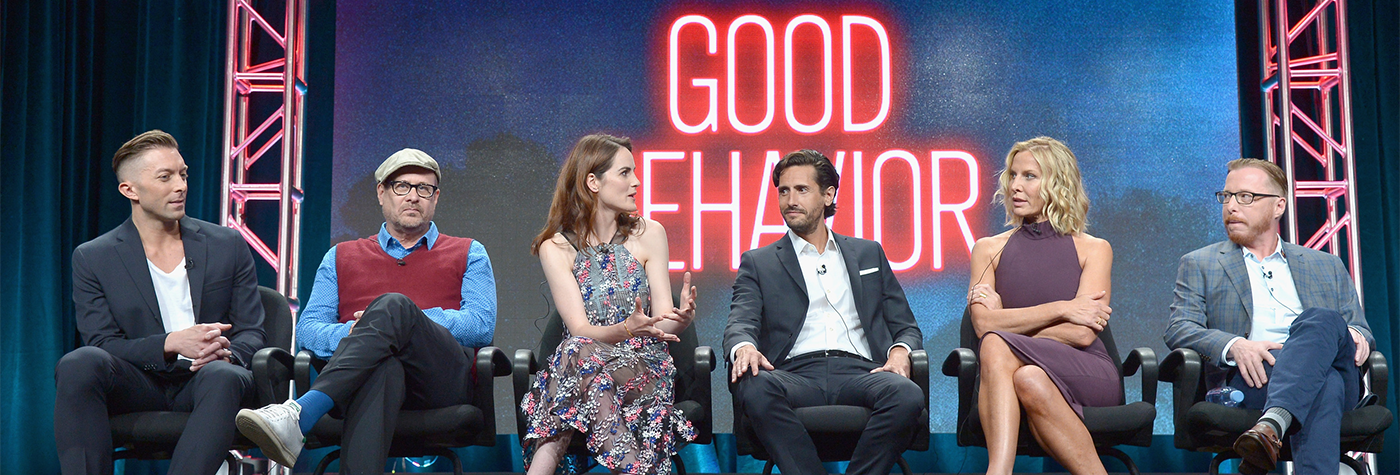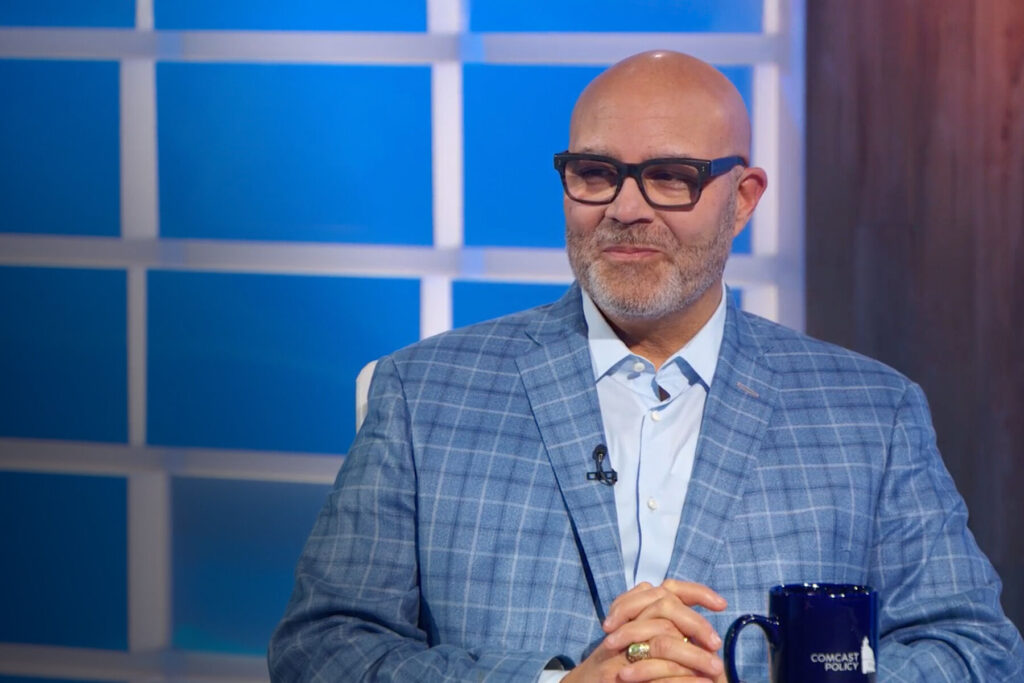With the cable portion now wrapped up at the TV Critics Association tour in Los Angeles, it’s safe to say that the critics never run short of questions throughout their eight-hour days stacked with panels of the best producers and casts found on television. For many, the TCA tour is the time to gain access to the various minds and talent making these shows possible, to get the scoop on what’s coming up next season, to find out the prep work it takes for characters to come to life on screen, or to just get to know a show’s writers, executives and actors on a more personal level. But as we all know, TV has gone through a metamorphosis in the past decade, both with the expansion of programming and the way we consume content. And who better to navigate us through TV’s journey than the critics themselves who spend most of their waking hours immersed in the myriad of programming out there?
Eric Deggans is a seasoned veteran of the TCA tours since 1997. He previously worked at the Tampa Bay Times before taking on the TV critic and correspondent gig at NPR in 2013. “When I first came [to a TCA tour], it was largely newspaper critics,” said Deggans. There were fewer networks and fewer shows, too.
But with the eventual downturn in the newspaper industry, many critics lost their jobs. Ironically, at the same time, television exploded like never before. “People were attaching a lot of importance to TV in their recreational lives,” said Deggans, along with the adoption of smartphones, tablets and binge watching as tools and ways to consume TV.
“TV has gone through a metamorphosis in the past decade, both with the expansion of programming and the way we consume content.”
While NPR always had a film critic, there was never a full-time TV critic at the organization prior to Deggans. It took the media outlet a little awhile to realize that TV had risen to a spot in people’s lives where it warranted a need for someone to talk about programming and TV news on the air and online. That move, if any, clearly signaled that TV was just getting better and occupying a larger chunk of people’s lives. “TV morphed into media, and now we’re talking about streaming services, media technology, and more. The beat really grew,” said Deggans.
Now, half the room at the TCA tour, if not more, come from online-only publications, like Vox.
Todd VanDerWerff, a culture editor for Vox, does a lot of long-form pieces that range from examining the pattern of deaths of characters across television, to an in-depth look at TBS’s Full Frontal With Samantha Bee. And since Vox targets a general interest audience, VanDerWerff writes his pieces with an eye towards convincing readers to watch a particular show rather than assuming they have.
Looking back, VanDerWerff, who has been critiquing television programming professionally since 2009, commented that TV reporting used to be “a pretty easy gig.” The former A.V. Club writer said that it used to be like this: TV critics got the pilot screen, reviewed it at its debut, checked in later in the season and then at the finale. Then came the rise of episodic recaps, which are still out there but usually aren’t very sustainable outside of a show like HBO‘s Game of Thrones.“Literally, a huge audience will read anything on [Game of Thrones],” said VanDerWerff.
But there are a lot of different ways to report on TV. In describing his coverage, Deggans said he does a bit of everything. One day he might give a straight up review of HBO’s The Night of, and the next he might write a reflective piece on The Wire, and what it means for a show that wrapped up eight years ago to be available to watch again. Or he might do a piece that delves into controversial issues like race and gender and how they play out in programming. “I think it’s important that critics take a look at how these [social issues] are depicted on TV because it can tell you a bit about how we’re feeling about it as a society,” said Deggans.
In VanDerWerff’s opinion, this type of TV critiquing, which involves larger essays, fares better with audiences than the entertainment news and recaps. “That’s kind of like saying, ‘I’m recommending a show to you when it starts, but also putting it into context in society with politics and other stuff you see on TV,’” said VanDerWerff.
As for how changing viewing habits are impacting his work, VanDerWerff admits that he sometimes wonders whether to evaluate a show based on how it runs as a story if watched continuously back to back, or judged by individual episodes. Because sometimes, “the individual episodes are not very good, but the totality of them is very good,” he explained. Nowadays, a lot of writers are looking to evaluate full seasons of shows in their critiques: “I think we are going to move to a place where networks are more comfortable with saying, this show is a weekly show, then this other show we can release an episode every three or four days, and this show is a show to be binged.”
“Our main job is to be independent and incisive,” said Deggans, referring to his role at NPR. Sometimes, for TV critics, that means digging deeper and exploring challenging topics that aren’t usually brought to the table. And the TCA tour is always a prime opportunity to start that exploration: “When I get the mic, I’m going to ask the tough questions.”
This blog also appeared in CTAM Smartbrief. To sign up, click here.
“TV has gone through a metamorphosis in the past decade, both with the expansion of programming and the way we consume content.”
While NPR always had a film critic, there was never a full-time TV critic at the organization prior to Deggans. It took the media outlet a little awhile to realize that TV had risen to a spot in people’s lives where it warranted a need for someone to talk about programming and TV news on the air and online. That move, if any, clearly signaled that TV was just getting better and occupying a larger chunk of people’s lives. “TV morphed into media, and now we’re talking about streaming services, media technology, and more. The beat really grew,” said Deggans. Now, half the room at the TCA tour, if not more, come from online-only publications, like Vox. Todd VanDerWerff, a culture editor for Vox, does a lot of long-form pieces that range from examining the pattern of deaths of characters across television, to an in-depth look at TBS’s Full Frontal With Samantha Bee. And since Vox targets a general interest audience, VanDerWerff writes his pieces with an eye towards convincing readers to watch a particular show rather than assuming they have. Looking back, VanDerWerff, who has been critiquing television programming professionally since 2009, commented that TV reporting used to be “a pretty easy gig.” The former A.V. Club writer said that it used to be like this: TV critics got the pilot screen, reviewed it at its debut, checked in later in the season and then at the finale. Then came the rise of episodic recaps, which are still out there but usually aren’t very sustainable outside of a show like HBO‘s Game of Thrones. “Literally, a huge audience will read anything on [Game of Thrones],” said VanDerWerff. But there are a lot of different ways to report on TV. In describing his coverage, Deggans said he does a bit of everything. One day he might give a straight up review of HBO’s The Night of, and the next he might write a reflective piece on The Wire, and what it means for a show that wrapped up eight years ago to be available to watch again. Or he might do a piece that delves into controversial issues like race and gender and how they play out in programming. “I think it’s important that critics take a look at how these [social issues] are depicted on TV because it can tell you a bit about how we’re feeling about it as a society,” said Deggans. In VanDerWerff’s opinion, this type of TV critiquing, which involves larger essays, fares better with audiences than the entertainment news and recaps. “That’s kind of like saying, ‘I’m recommending a show to you when it starts, but also putting it into context in society with politics and other stuff you see on TV,’” said VanDerWerff. As for how changing viewing habits are impacting his work, VanDerWerff admits that he sometimes wonders whether to evaluate a show based on how it runs as a story if watched continuously back to back, or judged by individual episodes. Because sometimes, “the individual episodes are not very good, but the totality of them is very good,” he explained. Nowadays, a lot of writers are looking to evaluate full seasons of shows in their critiques: “I think we are going to move to a place where networks are more comfortable with saying, this show is a weekly show, then this other show we can release an episode every three or four days, and this show is a show to be binged.” “Our main job is to be independent and incisive,” said Deggans, referring to his role at NPR. Sometimes, for TV critics, that means digging deeper and exploring challenging topics that aren’t usually brought to the table. And the TCA tour is always a prime opportunity to start that exploration: “When I get the mic, I’m going to ask the tough questions.” This blog also appeared in CTAM Smartbrief. To sign up, click here.









